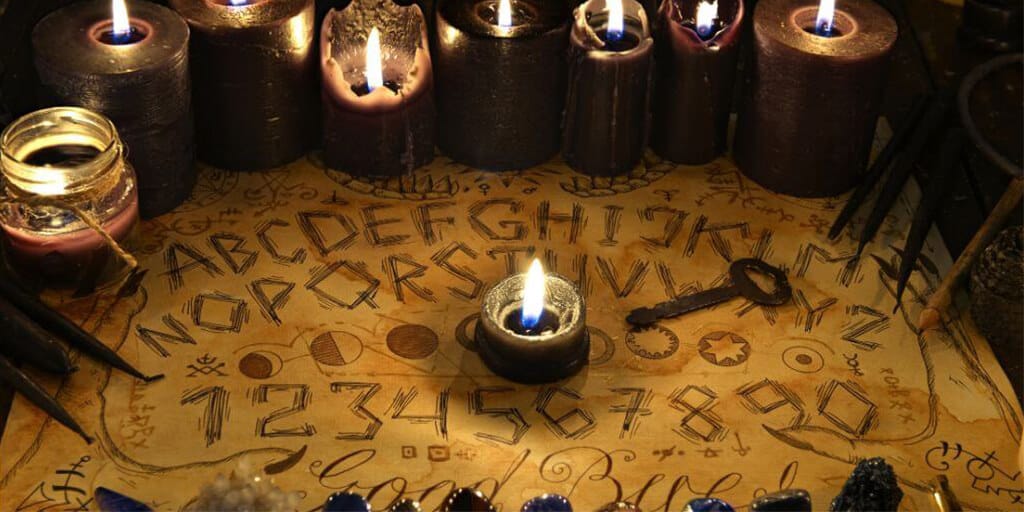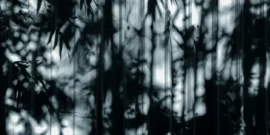Psychics and Mediums—Part 1: Understanding the Occult, the Paranormal, and Psychic-Mediums

The field of occultism is filled with intriguing and mysterious terms such as precognition, paranormal, clairvoyance, clairaudience, clairsentience, psychometry, and telekinesis. In what follows, I will delve into these enigmatic concepts to help readers better understand ghosts and psychic phenomena.
The Occult
The term occult comes from the Latin word occultus, which literally means “hidden,” “secret,” or “concealed.” The term refers to hidden or secret knowledge, “to that which is beyond the range of ordinary human knowledge; to mysterious or concealed phenomena; to inexplicable events.”[1] The term is often used in reference to certain practices, loosely known as the “occult arts.” These include divination, necromancy (contact with the dead), fortunetelling, and magic.
Such occult arts have three main characteristics:
- They unveil knowledge that is beyond the realm of ordinary human perception—that is, beyond what can be perceived through the five senses;
- They often facilitate encounters between individuals and supernatural powers, paranormal entities, or malevolent forces; and
- They are claimed to empower individuals to manipulate or exert influence over others in order to elicit desired actions.
Occultism comes in many forms. Common occult practices include trance states, séances, clairvoyance, telepathy, psychometry, telekinesis, spiritism (also called channeling), automatic handwriting, crystal gazing, levitation, and out-of-body experiences. I have personally witnessed occultists engaging in some of these practices.
The Paranormal
The term “paranormal” is used to describe phenomena that are beyond what is considered normal or scientifically explainable. Similarly, the term “supernatural”—in the context of occultism—refers to things that transcend the natural world. When we talk about the paranormal and the supernatural, we are referring to an interaction with and exploration of unseen forces, energies, powers, or spirits that cannot be objectively measured or understood. The paranormal often involves the pursuit of supernatural abilities or the acquisition of hidden information beyond our natural senses.
Divination
Divination, the art of foreseeing or predicting future events and uncovering hidden knowledge, has been practiced since ancient times, including during biblical times. In pagan societies, various forms of divination were used to predict the future or to seek the will of the gods. Some ancient occultists communicated with the dead through spiritists or mediums to gain paranormal insight (Deuteronomy 18:11; 1 Samuel 28:3,9). Others dabbled in witchcraft, aiming to extract information from various pagan deities (Numbers 22:7; 23:23; Joshua 13:22).
Some individuals in ancient times dabbled in casting spells (Deuteronomy 18:11) or practicing sorcery (Exodus 22:18; Deuteronomy 18:10). Others analyzed omens (Genesis 30:7; 44:5). The Babylonian occultists sought to observe and interpret the movements of the stars (astrology), as it was believed that the stars were connected to the pagan deities (Daniel 1:20; 2:2,10,27; 4:7; 5:7,11,15). In addition, some engaged in soothsaying by, for example, examining the liver of a deceased animal that had been sacrificed. If any abnormalities were found in the liver, they would attempt to interpret them as possible indications of the will of the gods.
Modern forms of divination include astrology, crystal gazing, palmistry, fortunetelling, and necromancy (contact with the dead). I will expand on these and other forms of divination below.
Psychics
The term “psychic” refers to people who claim to have a heightened sensitivity to phenomena beyond the scope of our five senses. These individuals engage in a variety of paranormal activities, such as contacting the dead, acting as conduits for spirit entities such as “spirit guides” and angels, and practicing diverse forms of divination. Their psychic powers are claimed to include:
- telepathy—the ability to receive or transmit thoughts to another person;
- precognition—involving supernatural knowledge about future events;
- clairvoyance—the ability to see something beyond natural means about the past, present, or future; and
- psychometry—the ability to gain insight about the owner or past owners of an object (like a hairbrush) simply by holding it.
Modern psychics offer these insights to help people better understand their work:
- James Van Praagh claims that the spirit world operates at a frequency much higher than our own. These spirits “vibrate” so rapidly that their messages are beyond our mortal comprehension. It’s like watching a ceiling fan; the blades on the fan can spin so fast that they’re hard to see. Van Praagh claims that psychic mediums have the ability to discern these rapid-fire messages.[2]
- John Edward likens psychic energy to radio waves. Just as radio waves exist even when a radio is not turned on, the invisible realm of psychic energy is always present. Like tuning in to a radio station, Edwards flips on his metaphysical switch during a psychic reading to receive messages from the beyond.[3]
- Sylvia Browne claims that different psychics have different abilities. “Just as a God-given musical gift can manifest itself in a variety of ways, from singer to composer to musician to conductor, the specifics of the psychic gift have varied from one generation of my family to another.”[4] She claims that some in her family have had the ability to enter a trance-like state, allowing a spiritual entity to perceive, communicate, and hear through them, while others in the family are devoid of this ability.
Trance State
A trance state involves what is often called “an altered state of consciousness”—ranging from a gentle perception of the transcendent to a deep and profound trance. In this state, individuals often claim to experience oneness with all things and a resonance with the cosmos. This state is sometimes referred to as “cosmic consciousness.” In this state, people often claim mystical experiences with spiritual entities, such as “spirit guides” or perhaps angels.
Medium
A medium is a person who claims to have the ability to bridge the gap between the spiritual and physical realms. They claim the ability to tune into the rapid vibrations of the spirit world and convey messages from spirits to people on earth. The term “medium” suggests a role as an intermediary or mediator connecting the two realms.
Some psychic mediums distinguish between two types: mental mediums and physical mediums. A mental medium, the more common variety, is said to use the “intuitive mind.” This form of mediumship may involve clairvoyance (clear perception of the spirit world), clairaudience (clear hearing of the spirit world), or clairsentience (clear sensing of the spirit world). (The prefix “clair” in each of these words means “clear.”)
The second category is the physical medium. Unlike a mental medium, who uses only the mind, a physical medium makes their entire body available to a spiritual entity.
Mediums have gained popularity due to their purported ability to communicate with deceased loved ones who have “crossed over” to the “other side.” Prominent psychic mediums include James Van Praagh, John Edward, and Sylvia Browne. Their books—many of which I have read for research purposes—have regularly appeared on the New York Times bestseller list. Clearly, psychic-mediums have become a significant part of western culture.
In Part 2 of this article, I will briefly examine spiritism, channeling, and spirit guides.
I also invite you to consult my article, “A Christian Assessment of Psychics and Ghosts,” posted here at the John Ankerberg Show website.
Go Deeper
- Israel Resource Center
- The Kingdom of the Cults
- Relief for Ukraine
- Jesus’ 7 Last Cries From The Cross – Package Offer
- Ron Enroth, “The Occult,” Evangelical Dictionary of Theology, ed. Walter Elwell (Grand Rapids: Baker, 1984), p. 787. ↑
- James Van Praagh, Heaven and Earth (New York: Pocket Books, 2001), p. 78. ↑
- John Edward, One Last Time (New York: Berkley Books, 1999), p. 53. ↑
- Sylvia Browne, Life on the Other Side (New York: Signet, 2000), p. 3. ↑









is this all the information on the paranormal, occult ? Is there any groups within this information ?
Hi Deborah,
Thank you for your question. This article is part of a three-part series aimed at providing an
overview of various concepts related to the paranormal and occult, including definitions and
descriptions of specific phenomena and practices. Here are the links to the other articles in this
series:
–Part 2: Understanding Spiritism, Channeling, and Spirit Guides
–Part 3: Perceiving and Contacting Ghosts
As with any overview, it’s not meant to be exhaustive. You can always zoom in on a portion that
interests you and explore it further. Here are some additional resources that might be helpful:
Other Articles by Dr. Ron Rhodes on Psychics:
–Assessing the Accuracy of Psychics
–A Primer on Psychic Techniques
–Understanding the Appeal of Psychics
A Great Book by Dr. Ron Rhodes on this Topic:
–Behind the Veil: Exposing the Truth about Ghosts, Mediums, and Psychic Phenomena
Books and Other Resources on this Topic by Dr. John Ankerberg:
–Occult Resources
Additional Articles on the Paranormal and Occult:
–What Happens During Channeling?
–The Spirits Behind the Channeling
–The Religious Philosophy of the Spirits Behind Channeling
–The Psychological Aspects of Channeling
–The Link Between Channeling and the Spirit World
–Popular Angels and the Occult
–How Do Channeled Messages Deny Christianity?
–Evil Angels: Spiritual Deception and Demon Possession
–Mantras and Mandalas in Occult Practices
I hope this helps! Feel free to reach out with any more questions.
Best regards,
The John Ankerberg Show